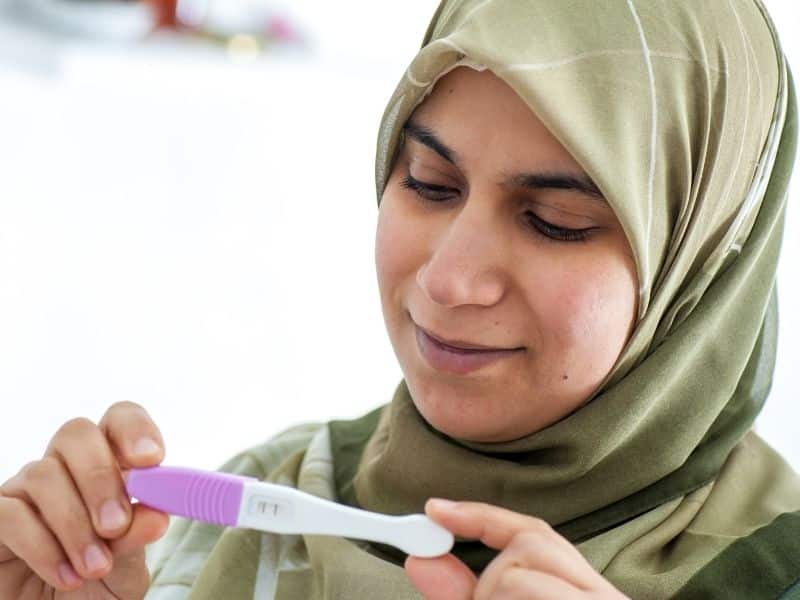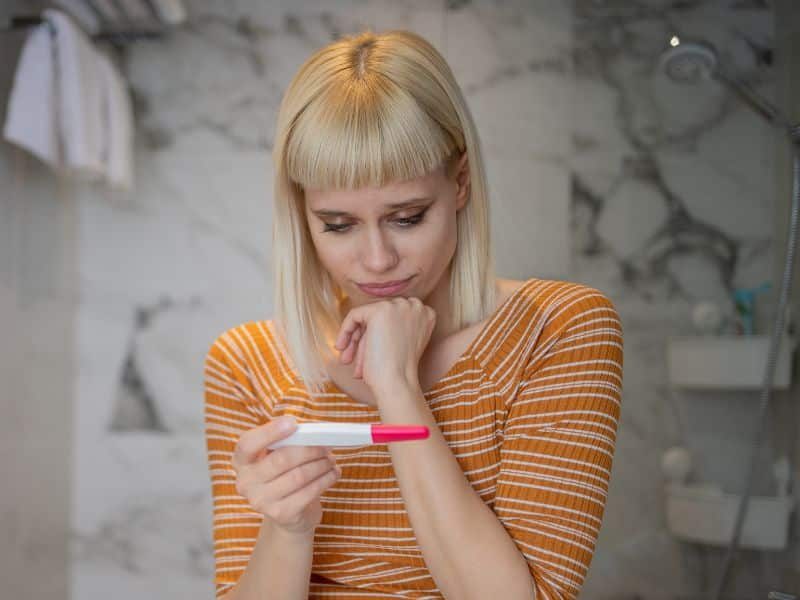When does it make sense to take a pregnancy test?
The question of when you should take a pregnancy test is a concern for many women who are wondering about possible
signs of pregnancy
and hope to have certainty soon. A pregnancy test usually provides reliable results from the first day of your missed period or around 14 days after ovulation. This is because the test uses the hormone hCG (human chorionic gonadotropin) which is produced in the uterine lining after implantation of the fertilized egg.
If you can hardly wait and notice early signs, you can also an early test which is possible a few days before the expected period. We have another section for you below on the reliability of early pregnancy tests.
Typical symptoms that could indicate pregnancy are
- Dizziness
- Increased urge to urinate
If you notice these symptoms and have had sexual intercourse in your last cycle, then it makes sense to take a pregnancy test.
How do I take a pregnancy test?
Performing a urine pregnancy test is easy and can usually be done in the comfort of your own home. You can usually buy a pregnancy test at the drugstore or your pharmacy. Here are some steps to help you use the test correctly:
Choose the time of the test: For the most reliable result, you should perform the test in the morning, as the urine is more concentrated and has higher hCG levels.
Prepare the test: Read the instructions on the packaging carefully. Each test may have slightly different instructions.
Collect urine sample: With most pregnancy tests, you can urinate directly onto the test strip or collect a urine sample in a clean container and dip the test strip into it.
Wait for the result: After you have carried out the test, you have to wait a certain amount of time, usually a few minutes. The exact time can be found in the package insert.
Read the result: The results are normally indicated by lines, a plus or minus sign or a digital display. A line or a plus sign in the control window indicates that the test has worked. The result in the test window shows whether you are pregnant or not. Some pregnancy tests also show you the week of pregnancy directly.
It is important to read the result within the specified time so that no distortions occur. If the result is unclear, you can repeat the pregnancy test or you can also take a pregnancy test at your gynecologist.
In addition to urine tests, gynecologists offer the following methods to determine pregnancy:
Blood test: This method is more accurate and can detect the pregnancy hormone hCG earlier and in lower concentrations than urine tests. There are two main types of blood tests:
- Qualitative hCG tests: They simply indicate whether or not hCG is present in the blood, similar to a urine test.
- Quantitative hCG tests (beta-hCG): These measure the exact amount of the hCG hormone in the blood. This information can be important to assess the progress of a pregnancy or to diagnose certain problems such as an ectopic pregnancy.
Ultrasound examination: Although not directly a pregnancy test, an ultrasound examination can be performed by the gynecologist to confirm and assess the pregnancy by directly visualizing the embryo or amniotic sac. This is often done after a positive blood or urine test. Depending on the type of ultrasound and the precision of the device, pregnancy can be detected at different times.
As a rule, the first signs of pregnancy, such as the amniotic sac or gestational sac, are visible from around the 5th week of pregnancy.
5th week of pregnancy
visible. This corresponds to approximately the third week after conception, as the weeks of pregnancy are traditionally counted from the first day of the last menstruation.
In order to 6. to Around the 7th week of pregnancy, the heartbeat of the embryo can often be detected by means of a vaginal ultrasound. This type of ultrasound is more sensitive than abdominal ultrasound due to its proximity to the pelvis and the higher resolution of the image. During an abdominal ultrasound, which is performed through the abdominal wall, these features may become visible somewhat later.
How many days after intercourse can I take a pregnancy test?
This question is quite natural, especially if you are hoping to be pregnant. After sexual intercourse that may have led to pregnancy, it is understandable that you want clarity as quickly as possible. It is generally recommended, wait until the first day of your missed period to take the pregnancy test. This often corresponds to about two weeks after fertilization. We know how hard this phase can be, especially when you are eagerly waiting for the next generation. Give yourself a big hug!
If you are in the fertility phase, it is advisable to track your cycle and take fertility tests around ovulation, which work in a similar way to pregnancy tests (urine test). This makes it easier for you to find out when you ovulated and you can take a pregnancy test or early pregnancy test 14 days after having sex, depending on whether your period has already stopped or you are about to have one. You can also plan your sexual intercourse better this way, as you will know your most fertile days in your cycle.
When is the pregnancy test positive?
Most commercially available pregnancy tests are designed to give positive results from around the first day of the missed period, which is about two weeks after fertilization and therefore also about two weeks after intercourse on the day of ovulation.
Some sensitive early tests can detect hCG in the urine a few days before the expected period, but the accuracy of these tests increases with increasing hCG levels.
It is understandable that the period of waiting and uncertainty can be emotionally challenging.

Can a pregnancy test be a false positive?
It is reassuring to know that false positive pregnancy test results are extremely rare. Pregnancy tests are usually very reliable, and most women who get a positive result are actually pregnant. However, there are exceptions under certain circumstances that can lead to a false positive result, although these cases are rare.
Some factors that can lead to a false positive result include:
Medication: Certain medications containing hCG or other hormonal therapies may affect test results.
Recently terminated pregnancy: If you were recently pregnant, including a miscarriage or abortion, hCG may still be present in your body, leading to a false positive result.
Certain medical conditions: Some rare medical conditions such as trophoblastic disease or some tumors can produce hCG.
Incorrect tests or application errors: Sometimes an expired or improperly stored test or incorrect reading of the result (e.g. after the recommended time) can lead to an incorrect result.
If you get a positive result and there is any doubt about its accuracy, it is advisable to take another test or see a gynecologist for further evaluation and possibly a blood test. A blood test can give you more precise information, as it measures both the presence and the amount of the hCG hormone in the blood.
What do I do if the pregnancy test is negative?
A negative pregnancy test result can be disappointing, especially if you were hoping for a positive result. But it can also bring relief, depending on your personal situation. If the test is negative and you still think you might be pregnant, there are a few steps you can take:
- Wait and repeat the test: Sometimes the test may have been carried out too early, before sufficient hCG is detectable in the urine. If your period is still pending, wait a few days and do the test again. The hCG concentration in the body doubles approximately every two days, so a test carried out later may give a different result.
- Check the test application: Make sure that the test has been carried out correctly. Read the instructions again and make sure that the test has not expired and has been stored correctly. Perhaps buy a test from a different brand, as pregnancy tests vary in sensitivity depending on the manufacturer. The slightly more expensive tests are usually better at determining low hCG concentrations.
- Observe other symptoms: Watch out for other signs of pregnancy, such as nausea, tiredness or changes in eating habits. If such symptoms persist, it may be advisable to consult a gynecologist.
- Seek medical advice: If there is still uncertainty or if your period is missing and the test is still negative, a blood test can be carried out, which can detect hCG more accurately and at an earlier stage than a home urine test.
A negative test result does not always mean that you are not pregnant. Sometimes the hCG levels are simply not yet high enough to be detected by home tests. Every body is different, and sometimes your body needs a few more days to produce enough hCG for a pregnancy test to be positive.
How do pregnancy tests work?
Pregnancy tests are designed to detect the hormone hCG (human chorionic gonadotropin), which is only produced in the body when a fertilized egg has implanted in the uterine lining.
Home urine tests involve urinating on a test strip or immersing it in urine. The strip contains chemicals that react with hCG when it is present in the urine. This reaction leads to a change on the test strip, such as the appearance of a line or a plus sign, which indicates whether hCG is detectable. Digital tests work in a similar way, but display the result directly as text such as “Pregnant” or “Not pregnant”.
Blood tests carried out by a gynecologist can detect hCG in the blood and provide detailed information on the amount of the hormone. They are particularly precise and can provide accurate information about the presence and stage of a pregnancy.
These pregnancy test methods are generally very reliable when used correctly.
How safe are early pregnancy tests?
Early pregnancy tests are designed to detect the hCG hormone even before you miss your period, making them a tempting option for many who want to know about pregnancy as early as possible. However, it is important to know the reliability of these early tests.
Early pregnancy tests are generally more sensitive than standard pregnancy tests. You can detect small amounts of hCG in your urine, often a few days before your expected period. Despite this sensitivity, there are some factors that can influence the accuracy:
Time of the test: The earlier the test is carried out, the lower the amount of hCG that could be present in the urine. This increases the risk of false negative results, where the test indicates that there is no pregnancy when in fact there is.
Fluctuating hCG levels: The hCG concentration can increase to varying degrees from woman to woman. Some women produce high amounts very early, others less quickly, which influences early detection by pregnancy tests.
Test quality: Different early tests have different levels of sensitivity and the quality may vary. Depending on the manufacturer, there are different times when you can test before you miss your period. On average, 3 days before a missed period is normal.
Although early testing is an effective way to detect pregnancy before a missed period, many experts recommend testing on or after the day your period is due for the most accurate results. If an early test shows a negative result and there is no period, the test should be repeated a few days later.
When should you take a pregnancy test: in the morning or in the evening?
Choosing the right time for a pregnancy test can influence the accuracy of the result. The general recommendation is to take the test in the morning, especially the first urine of the day. This is because morning urine is usually more concentrated as it has accumulated overnight.
This higher concentration of hCG, the pregnancy hormone, makes it more likely to get an accurate result, especially in early pregnancy.
early pregnancy
when hCG levels are still relatively low.
However, if you use a high-sensitivity pregnancy test, it might be possible to get reliable results at any time of day. Nevertheless, many manufacturers prefer morning urine for the optimum test time.
When can I take a pregnancy test after ICSI?
After an ICSI treatment, in which the fertilized egg is transferred back into the uterus, it is actually common to take the pregnancy test 14 days after the implantation of the egg (embryo transfer).
These 14 days correspond to the period in which the embryo should implant and start producing hCG if the implantation was successful. A pregnancy test at this time gives the hCG levels enough time to rise to a detectable level.
When can you take a pregnancy test if you are taking the pill?
This question is relevant for women who suspect they are pregnant despite taking the contraceptive pill regularly. Although the pill is very effective when used correctly, no contraceptive offers 100 percent safety.
If you are taking the pill and notice signs of pregnancy or miss a period, you can take a pregnancy test. It is advisable to take the test as soon as you miss your first period or if you notice symptoms such as morning sickness or unusual tiredness. Taking the pill does not normally affect the accuracy of a pregnancy test, as the test measures the presence of the hCG hormone, which is only produced when a pregnancy is present.
The best time for a test is in the morning, as this is when the urine is most concentrated, leading to a more reliable result. If the test is negative but you still have symptoms or your period doesn’t come, you should repeat the test after a few days or see a doctor for further tests.
If you take the take the pill continuouslywithout the usual breaks for bleeding, the question of when you should take a pregnancy test can be a little more complicated. As there are no regular periods that could serve as an indicator for the absence of menstruation, other factors must be taken into account.
In such a case, it is advisable to take a pregnancy test if you notice symptoms of pregnancy, such as:
- Persistent fatigue
- Morning sickness or persistent nausea at other times of the day
- More frequent urge to urinate
- Sensitivity of the breasts
These symptoms may indicate that a pregnancy may have occurred despite taking the pill. Since you have no periodic bleeding to serve as an indicator, the physical signs of pregnancy are often the most reliable clues.
It is generally recommended to perform the pregnancy test in the morning in order to maximize the concentration of the hCG hormone in the urine. If you have a negative test but continue to feel symptoms or are unsure, repeat the test after a few days or consult your doctor for a blood test, which can detect hCG more accurately and earlier than home urine tests. A visit to the doctor can also be helpful to rule out other possible causes for your symptoms.
Pregnancy test positive: what now?
Here we have an article on “Pregnant and now?” to give you an initial guide.
You should also start looking for a midwife straight away, even if this seems strange to you. It will help you in all matters, even if the pregnancy ends in an abortion. So don’t be shy! You can use our platform ammely.de for this.






